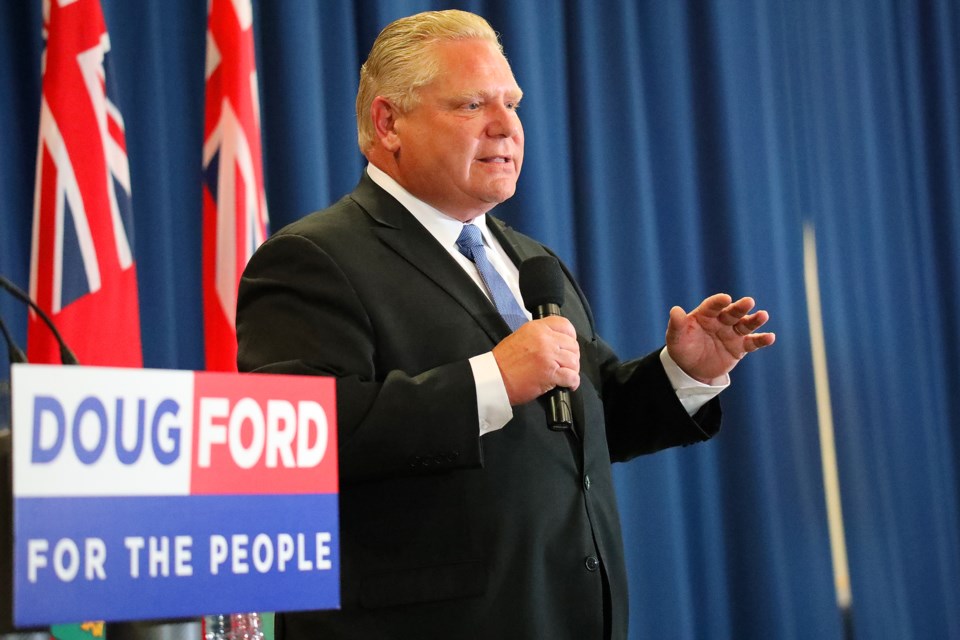Should Barrie’s next mayor have the power to make important decisions for city council?
In early September, the Ontario government gave the mayors of Toronto and Ottawa the authority to veto bylaws that conflict with provincial priorities, such as building housing — although those councils can override the mayor's veto with a two-thirds majority vote.
The Strong Mayors, Building Housing Act also gives these mayors responsibility for preparing and tabling their city's budget, instead of council, appointing a chief administrative officer (CAO), and hiring and firing department heads, except for statutory appointments such as an auditor general, police chief or fire chief.
On Monday, Ontario Premier Doug Ford said he will extend strong mayor powers to other large Ontario cities next year, which would likely include Barrie.
The candidates for mayor in the Oct. 24 election were asked by BarrieToday to weigh in on the subject of strong mayors.
Barry Ward said there are many things wrong with the law, including that it was introduced without any consultation with municipalities, or anyone else, was not mentioned during the provincial election campaign and then was introduced a few months later, following the June 2 vote.
“It will jeopardize the independence of the city's CAO and other municipal affairs, since the mayor will have the power to fire them,” he said. “And it will do nothing to encourage more housing, one of the things it is supposed to do.
“(The law) would also harm the mayor's relationship with council, creating a me-versus-them instead of encouraging mayors to work with his or her fellow council members,” Ward added. “It is also anti-democratic, asking mayors to follow provincial government priorities, rather than the wishes of the people that elected them.
“Obviously, I would not use the powers of the ‘strong mayors law’,” he said. “If I am incapable of putting together the support of a majority of council members for one of my priorities, either I am not doing my job or it is a bad idea.”
Gerry Marshall is also opposed to the new law, which takes effect after Ontario’s municipal elections.
“The idea that giving more powers to mayors so that at a snap of their fingers more housing will be built is an improbable outcome,” he said. “(It) is attempting to set the stage to provide mayors with a sweeping set of new powers. I say no thanks to all of this.”
Marshall said that after eight years as Penetanguishene mayor and four years as Simcoe County warden, he knows from experience that he didn’t need special powers to build more housing, that housing developments continuously proceeded — although the approval processes can be improved and accelerated.
“Barrie residents elect a council of 11 people with the expectation that these 11 council members will research, seek public input, read staff reports, and debate issues,” he said. “Once debated, the will of council will be determined by a majority vote. I fully believe in this democratic process and if given strong mayors powers I would set them aside and have all of council weigh into all matters.”
Mike McCann said he understands the need for a strong mayors law for municipalities with the population and geographic size of Toronto and Ottawa, but does not support it for Barrie.
“I will provide the leadership that builds consensus around the council table to ensure that our bylaws align with provincial priorities,” he said. “It is critical, in our democracy, that ward councillors have the ability to identify issues important to their wards and that the councillors have a say in budget building.
“I will work collaboratively with my councillors to address the challenges facing our community including housing affordability, growth (and) road repair, to name few,” McCann added. “We will all have a say in budget building and the hiring and firing of the chief administrative officer.”
Andrew Gordon said stronger mayors mean voters have more responsibility.
“In my opinion, taking away democracy is a bad idea,” he said. “If this power is given to the mayors of smaller cities, then voters need to make sure they put a mayor in office with strong ethics and integrity.”
Alex Nuttall gave this answer as his position on the strong mayors law.
“My vision for Barrie is to have a council that is collaborative and works together to address the issues that Barrie residents are facing,” he said. “As public service professionals, we all share the same goal, which is to address the issues that we've been hearing at the doors: reducing crime, generating jobs and creating safer streets for Barrie residents and their families.”
Rob Haverson and Weldon Hachey, the other candidates for Barrie mayor, did not return messages Tuesday asking for comment to BarrieToday for this story.
— With files by the Canadian Press


